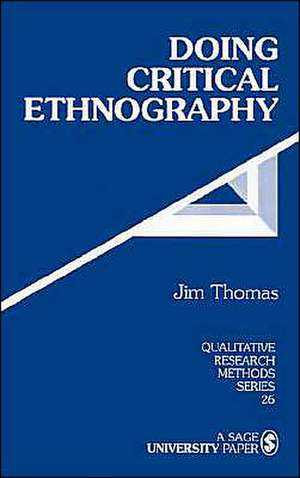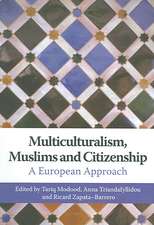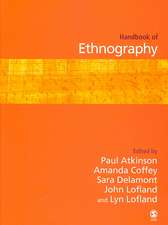Doing Critical Ethnography: Qualitative Research Methods, cartea 26
Autor Jim Thomasen Limba Engleză Paperback – 14 ian 1993
Din seria Qualitative Research Methods
-
 Preț: 286.15 lei
Preț: 286.15 lei -
 Preț: 322.19 lei
Preț: 322.19 lei -
 Preț: 273.68 lei
Preț: 273.68 lei -
 Preț: 286.15 lei
Preț: 286.15 lei -
 Preț: 323.44 lei
Preț: 323.44 lei -
 Preț: 323.15 lei
Preț: 323.15 lei -
 Preț: 321.79 lei
Preț: 321.79 lei -
 Preț: 323.70 lei
Preț: 323.70 lei -
 Preț: 321.52 lei
Preț: 321.52 lei -
 Preț: 322.05 lei
Preț: 322.05 lei -
 Preț: 134.60 lei
Preț: 134.60 lei -
 Preț: 288.79 lei
Preț: 288.79 lei -
 Preț: 290.33 lei
Preț: 290.33 lei -
 Preț: 317.26 lei
Preț: 317.26 lei -
 Preț: 287.82 lei
Preț: 287.82 lei -
 Preț: 290.54 lei
Preț: 290.54 lei -
 Preț: 289.56 lei
Preț: 289.56 lei -
 Preț: 288.04 lei
Preț: 288.04 lei - 18%
 Preț: 715.81 lei
Preț: 715.81 lei -
 Preț: 291.07 lei
Preț: 291.07 lei -
 Preț: 290.69 lei
Preț: 290.69 lei -
 Preț: 288.41 lei
Preț: 288.41 lei -
 Preț: 289.18 lei
Preț: 289.18 lei -
 Preț: 317.26 lei
Preț: 317.26 lei -
 Preț: 288.19 lei
Preț: 288.19 lei -
 Preț: 290.33 lei
Preț: 290.33 lei -
 Preț: 290.69 lei
Preț: 290.69 lei -
 Preț: 315.75 lei
Preț: 315.75 lei -
 Preț: 290.69 lei
Preț: 290.69 lei -
 Preț: 290.33 lei
Preț: 290.33 lei -
 Preț: 315.36 lei
Preț: 315.36 lei -
 Preț: 290.54 lei
Preț: 290.54 lei -
 Preț: 290.69 lei
Preț: 290.69 lei -
 Preț: 290.69 lei
Preț: 290.69 lei -
 Preț: 291.07 lei
Preț: 291.07 lei -
 Preț: 285.77 lei
Preț: 285.77 lei -
 Preț: 289.77 lei
Preț: 289.77 lei -
 Preț: 315.36 lei
Preț: 315.36 lei -
 Preț: 288.04 lei
Preț: 288.04 lei -
 Preț: 289.95 lei
Preț: 289.95 lei -
 Preț: 285.62 lei
Preț: 285.62 lei -
 Preț: 288.19 lei
Preț: 288.19 lei -
 Preț: 285.62 lei
Preț: 285.62 lei -
 Preț: 316.12 lei
Preț: 316.12 lei -
 Preț: 314.76 lei
Preț: 314.76 lei
Preț: 317.10 lei
Nou
Puncte Express: 476
Preț estimativ în valută:
60.69€ • 63.12$ • 50.10£
60.69€ • 63.12$ • 50.10£
Carte tipărită la comandă
Livrare economică 14-28 aprilie
Preluare comenzi: 021 569.72.76
Specificații
ISBN-13: 9780803939233
ISBN-10: 080393923X
Pagini: 96
Ilustrații: 1, black & white illustrations
Dimensiuni: 152 x 218 x 8 mm
Greutate: 0.15 kg
Ediția:1
Editura: SAGE Publications
Colecția Sage Publications, Inc
Seria Qualitative Research Methods
Locul publicării:Thousand Oaks, United States
ISBN-10: 080393923X
Pagini: 96
Ilustrații: 1, black & white illustrations
Dimensiuni: 152 x 218 x 8 mm
Greutate: 0.15 kg
Ediția:1
Editura: SAGE Publications
Colecția Sage Publications, Inc
Seria Qualitative Research Methods
Locul publicării:Thousand Oaks, United States
Cuprins
Resisting Domestication
Beginning to Think Critically
Implementing Critical Ethnography
Empirical Application
Conclusion
Tricks, Traps, and Moving Beyond
Beginning to Think Critically
Implementing Critical Ethnography
Empirical Application
Conclusion
Tricks, Traps, and Moving Beyond
Notă biografică
Dr. Thomas continues to teach at NIU as adjunct professor. He also teaches at the University of Illinois at Chicago. Thomas remains active in the NIU chapter of the American Correction Association, among other pursuits.
Descriere
In this volume, Thomas unites two traditions in social science - critical theory and qualitative research - in an attempt to apply a critical worldview to the conventional logic of cultural inquiry. Rather than standing in opposition to traditional ethnography, it offers a style of considering the direct relationship between knowledge, society, and political action. Thomas addresses the question: If the duty of the researcher entails the righting of social wrongs as well as producing valid research results, how is it possible to juxtapose the two goals? He defines the rules and guidelines for a praxis-oriented ethnographic tradition, one both ideologically engaged and scientifically valid. In addition, he outlines the various types of critical ethnography, explaining the tenets of each and how research can be carried out under these frameworks.















